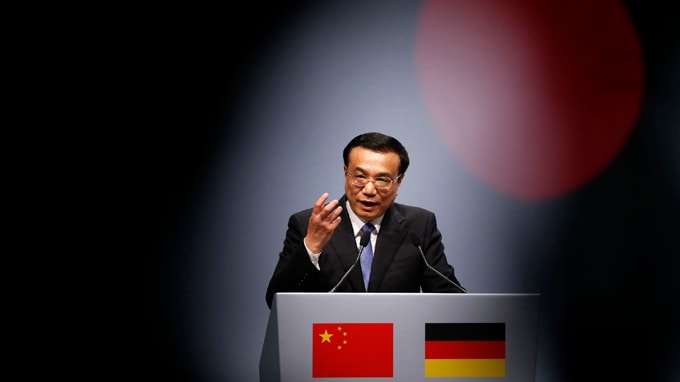Trade war with China, Europe de-escalates
Europe has had to back down to ease tensions in its trade war with China.
Yesterday, Trade Commissioner Karel De Gucht was forced to lower the anti-dumping duties the EU planned to impose on Chinese-made solar panels.
Chinese Premier Li Keqiang during his visit to Germany last week
- Photo: AFP
Mr. De Gucht, who initially proposed a 47.6% tariff, said the tariff on the Chinese goods would be reduced to 11% between now and August.
According to the New York Times, Mr. De Gucht still warned China that the EU would increase tariffs to the ceiling in August if Beijing did not resolve allegations that Chinese companies were selling solar panels in the EU at prices below the actual cost of production.
Initially, the EU intended to take tough measures immediately. However, pressure, especially from Berlin, due to fears that tensions with Beijing would affect trade with China, forced the EU to back down.
Last week, Chinese Premier Li Keqiang, while visiting Europe, bypassed De Gucht and convinced German Chancellor Angela Merkel and European Commission President Manuel Barroso to give China more time to negotiate. Li warned that China would retaliate if the EU rushed to impose anti-dumping duties on June 6 as originally planned. Xinhua quoted Li as telling Barroso that “there will be no winners in a trade war.”
Solar panels are one of China’s most important exports to Europe. At $27 billion a year, they account for more than 6% of China’s exports to the EU.
Western governments and corporations have long criticized Beijing for helping solar panel companies with large loans from state banks and large-scale research programs funded by the state budget.
China’s rapid dominance of the renewable energy market is remarkable. Beijing paid little attention to the sector until 2006, and it now dominates about two-thirds of the global market. State-owned banks have lent about $18 billion to domestic companies in the sector in the effort.
Li Junfeng, president of the China Renewable Energy Association, expressed his delight at the news. “It’s very good news,” said Li. “At 11 percent, Chinese companies can do well, and the tax rate won’t affect them much.”
Western corporations, in both solar and other sectors, have been cautious about criticizing Beijing publicly. China is now the world’s largest market for everything from steel to phones to cars. Chinese officials can use the channels of manufacturing licenses, export permits, and even visas to keep companies from criticizing it publicly.
According to Tuoi Tre - DT







